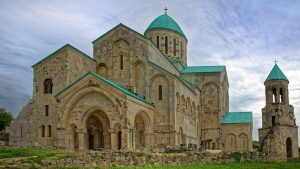 From the far-reaching heights of the Caucasus Mountains to the picturesque Black Sea coast, Georgia, a country tucked at the crossroads of Eastern Europe and Western Asia, is a hidden gem for the adventurous. One of the pearls in its crown is Kutaisi, an age-old city that holds a great significance in the nation’s history, culture, and spirituality.
From the far-reaching heights of the Caucasus Mountains to the picturesque Black Sea coast, Georgia, a country tucked at the crossroads of Eastern Europe and Western Asia, is a hidden gem for the adventurous. One of the pearls in its crown is Kutaisi, an age-old city that holds a great significance in the nation’s history, culture, and spirituality.
Once a thriving capital of the Kingdom of Georgia, Kutaisi boasts a rich historical tapestry that stretches back more than 3,500 years. Today, it serves as a portal to Georgia’s past, offering an abundance of landmarks, architectural marvels, and historical narratives.
The Historical Majesty of Kutaisi
Kutaisi’s strategic location on the Rioni River made it a focal point for trade, culture, and power over the millennia. Home to one of the oldest inhabited caves in the world, the Prometheus Cave, Kutaisi was already a notable settlement in prehistoric times. The city has played a vital role in Georgian history, serving as the capital during the reign of the Bagrationi Dynasty in medieval times, and again briefly in the early 20th century.
Wandering around Kutaisi, one can’t help but be awed by its ancient fortifications, ornate churches, and cobbled streets. These relics narrate tales of the city’s rich history, from the exploits of the mythical Golden Fleece to the dawn of Christianity in Georgia.
Sacred Landmarks and Architectural Wonders
The heart of Kutaisi is home to some of the most extraordinary architectural marvels in Georgia. The city’s most prominent symbol, the Bagrati Cathedral, is a UNESCO World Heritage Site that was originally built in the 11th century during the reign of King Bagrat III. Despite being partially ruined, the cathedral’s awe-inspiring architecture stands as a proud testament to Georgia’s medieval past.
Just a few kilometers from the city center lie the monastic complex of Gelati, another UNESCO World Heritage site. Founded in the 12th century by King David the Builder, Gelati was one of the foremost centers of culture and learning in the Middle Ages. Its beautifully preserved frescoes and mosaics are a visual feast, providing a vivid glimpse into the spiritual life of bygone eras.
A City of Culture
Besides its historical allure, Kutaisi is also a thriving hub of contemporary Georgian culture. The Kutaisi State Historical Museum houses more than 150,000 artifacts showcasing the region’s archaeology, ethnography, and art, allowing visitors to delve deeper into the vibrant culture and tradition of Georgia. The city’s bustling markets, quaint cafes, and verdant parks provide a captivating backdrop for immersing in the local lifestyle.
Kutaisi’s rich cultural life is not limited to museums and landmarks. The city is also known for its distinctive polyphonic singing, which has been recognized by UNESCO as an Intangible Cultural Heritage of Humanity. As you stroll through the city’s historic quarters, you may well chance upon a group of locals engaged in this deeply moving, harmonious form of expression.
The Future of Kutaisi
While Kutaisi reveres its past, it also has an eye on the future. In recent years, the city has become a hub of innovation and education, with the establishment of the Kutaisi International University. The institution aims to attract students from across the globe and establish Georgia as a leader in global education.
Kutaisi offers a unique blend of ancient history and modern aspirations. As the city propels into the future, it remains deeply rooted in its historical origins. Whether you are a history enthusiast, a culture


